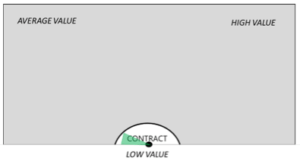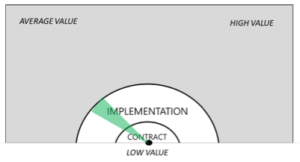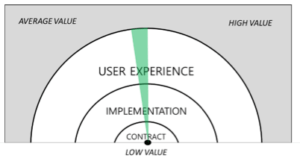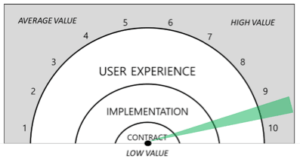From Mathijs de Wit – Newion Investments (@mathijsdewit)
It’s no secret that recurring revenue results in high valuations. However, I’m increasingly encountering people and companies that do understand the financial side of things, but have decoupled from the underlying dynamics. Let’s give this some thought!
I’d like to introduce a model that helps to define what the value of a single customer is. Look at it like a gauge or speedometer on how much value a single customer brings. It all starts with a contract. That results in a certain value based on three elements.
- Financial
- Time
- Terms
In essence, the contractual agreement of these three have little value. It’s only the mere start of a relationship. So, if only a contract is in place the model would look like this:

After the contract has been made the product is implemented in the operations of the customer. When the product is implemented, it results in a certain value based on three elements:
- Cost Reduction
- Revenue Increase
- Risk Decrease
In essence, the implementation proves the return on investments and results in some kind of lock-in. This makes the single customer obviously more valuable than when only the contract is place. Possibly even so valuable as the ROI or lock-in are high that the customer doesn’t even need attention anymore. So, the model would look like this:

However, this is where many product focused companies should step up and focus on user experience. As user experience results in a certain value based on three elements:
- Repeat customers – Retention increase
- Standardized business tool – People need the product to do their work
- Promotion and recommendations – NPS results in virality of the product
In essence the good user experience makes a single customer loyal and thus far more recurring than a long term contract. It’s not rocket science to understand that a recurring customer adds to value exponentially than to a single contracted customer. So, the model would look like this:

Over time, if the contract is renewed, more data is captured and the customer gets used to experiencing the product. This is when a single customer goes into overdrive and becomes a truly valuation contributing customer. This would look this:

Now if you agree with this model, you’re either treating user experience as your top priority or should start doing so. In either case start thinking about why feedback is so important and do some research into what type of customer criticizes you the most. As it is probably not only your cheerleaders that are going to make you a valuable company, but also the ones that are pushing you to improve the user experience of your product every day.
Another thought could go to how to implement the product. A customer implementing the product themselves is way more valuable than if you have to do it for them. Alternatively, an academy educating a customer on implementing could result in far more valuable customers than simply sending then a tutorial.
Or give the contract length some thought, customers that choose your product over and over again could be worth far more than the customers that have already signed a five year deal.
I’d love to hear from people who like this model and appreciate any feedback on it. And how valuable are your customers? Do they love you product or do you only have a contractual relationship? And, do you score a 10 or a 1? In any case: Let’s improve that user experience!

Nice model! I think the keyword of this post, without you actually mentioning it, is ‘churn’. Better user experience -> lower churn -> more effective use of resources and capital -> higher value.
“Customers that choose your product over and over again could be worth far more than the customers that have already signed a five year deal.” This is actually a very interesting thought. I think conventional wisdom is that the longer the contract lengths, the better (e.g. more predictability in cash flows). However, there is a strong signal if customer confirm the value of the proposition again and again, although it’s riskier (what if customers don’t renew?). How do you VCs include contract lengths in for example the valuation of company. What do you prefer?
@Thomas great reply! Nothing scientific on how to use contract length in determining the value of a company. But, there is an interesting relationship between long contract length and monthly contracts which get renewed every month. Preference depends on type of company. But, yearly contracts seems to be best for good valuation at this moment.